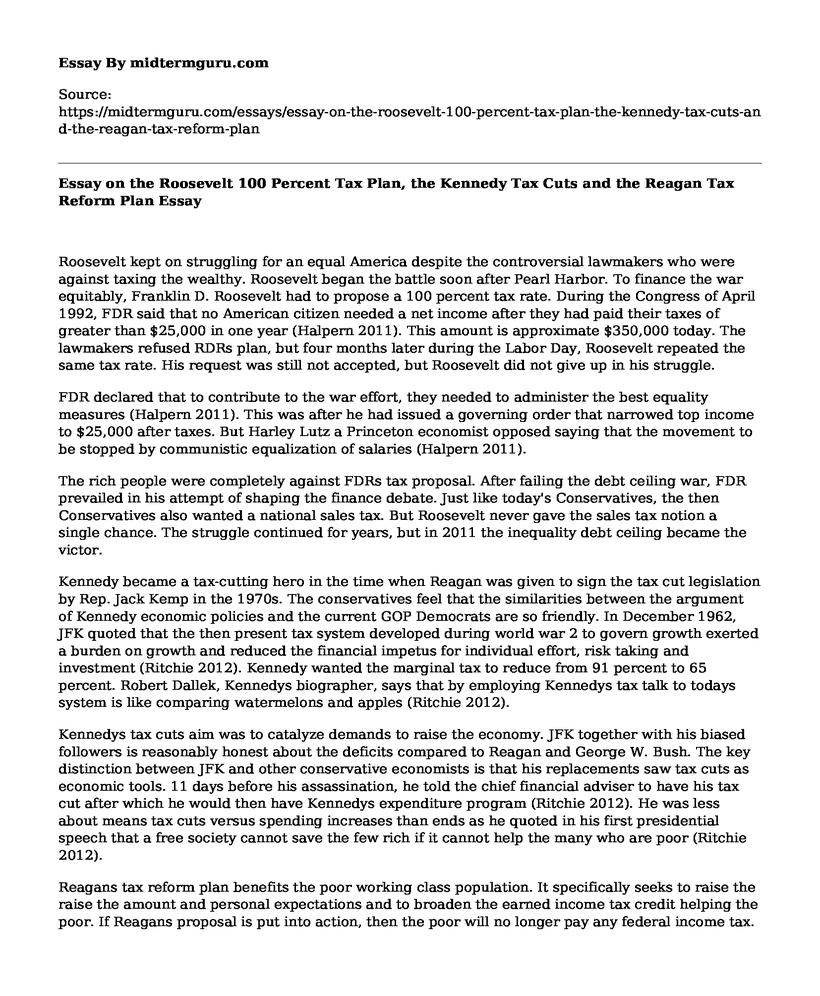Roosevelt kept on struggling for an equal America despite the controversial lawmakers who were against taxing the wealthy. Roosevelt began the battle soon after Pearl Harbor. To finance the war equitably, Franklin D. Roosevelt had to propose a 100 percent tax rate. During the Congress of April 1992, FDR said that no American citizen needed a net income after they had paid their taxes of greater than $25,000 in one year (Halpern 2011). This amount is approximate $350,000 today. The lawmakers refused RDRs plan, but four months later during the Labor Day, Roosevelt repeated the same tax rate. His request was still not accepted, but Roosevelt did not give up in his struggle.
FDR declared that to contribute to the war effort, they needed to administer the best equality measures (Halpern 2011). This was after he had issued a governing order that narrowed top income to $25,000 after taxes. But Harley Lutz a Princeton economist opposed saying that the movement to be stopped by communistic equalization of salaries (Halpern 2011).
The rich people were completely against FDRs tax proposal. After failing the debt ceiling war, FDR prevailed in his attempt of shaping the finance debate. Just like today's Conservatives, the then Conservatives also wanted a national sales tax. But Roosevelt never gave the sales tax notion a single chance. The struggle continued for years, but in 2011 the inequality debt ceiling became the victor.
Kennedy became a tax-cutting hero in the time when Reagan was given to sign the tax cut legislation by Rep. Jack Kemp in the 1970s. The conservatives feel that the similarities between the argument of Kennedy economic policies and the current GOP Democrats are so friendly. In December 1962, JFK quoted that the then present tax system developed during world war 2 to govern growth exerted a burden on growth and reduced the financial impetus for individual effort, risk taking and investment (Ritchie 2012). Kennedy wanted the marginal tax to reduce from 91 percent to 65 percent. Robert Dallek, Kennedys biographer, says that by employing Kennedys tax talk to todays system is like comparing watermelons and apples (Ritchie 2012).
Kennedys tax cuts aim was to catalyze demands to raise the economy. JFK together with his biased followers is reasonably honest about the deficits compared to Reagan and George W. Bush. The key distinction between JFK and other conservative economists is that his replacements saw tax cuts as economic tools. 11 days before his assassination, he told the chief financial adviser to have his tax cut after which he would then have Kennedys expenditure program (Ritchie 2012). He was less about means tax cuts versus spending increases than ends as he quoted in his first presidential speech that a free society cannot save the few rich if it cannot help the many who are poor (Ritchie 2012).
Reagans tax reform plan benefits the poor working class population. It specifically seeks to raise the raise the amount and personal expectations and to broaden the earned income tax credit helping the poor. If Reagans proposal is put into action, then the poor will no longer pay any federal income tax. If low-income families to be removed from tax rolls, the Reagan tax innovation ensures that they will never recur to the rolls as long as they are poor. In one of his speeches, he quoted that one must reject the idea that the society is always guilty when the law is broken. Each is responsible for their actions (pfiffner 2013).
References
Halpern, M. (2011). Labor. A Companion to Franklin D. Roosevelt, 155-185. doi:10.1002/9781444395181.ch9
Ritchie, D. A. (2012). Jacqueline Kennedy: Historical Conversations on Her Life With John F. Kennedy. Oral History Review, 39(1), 162-165. doi:10.1093/ohr/ohs010
Pfiffner, J. P. (2013). The Paradox of President Reagan's Leadership. Presidential Studies Quarterly, 43(1), 81-100. doi:10.1111/psq.12004
Cite this page
Essay on the Roosevelt 100 Percent Tax Plan, the Kennedy Tax Cuts and the Reagan Tax Reform Plan. (2021, Jul 02). Retrieved from https://midtermguru.com/essays/essay-on-the-roosevelt-100-percent-tax-plan-the-kennedy-tax-cuts-and-the-reagan-tax-reform-plan
If you are the original author of this essay and no longer wish to have it published on the midtermguru.com website, please click below to request its removal:
- The Relationship Between Financial Reporting and Audit Quality - Essay Sample
- Essay on Effects of Inadequate Medical Insurance
- Delta Air Lines Inc Case Study
- Fractional Reserve Banking - Essay Sample
- Pay Taxes: Individuals' Responsibility to the State - Essay Sample
- Popeyes vs Zaxby's: Assessing the Franchise System Before Investment - Essay Sample
- Softbank and the Dynamic Equity Market - Essay Sample







